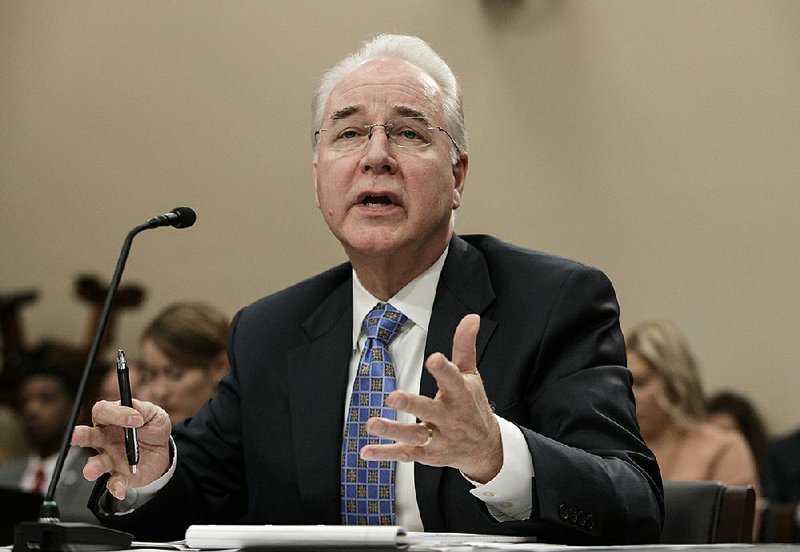WASHINGTON -- Health and Human Services Secretary Tom Price wouldn't say whether the administration of President Donald Trump still supports repeal of the Patient Protection and Affordable Care Act, days after his party's efforts to overhaul the law broke down.
"We find ourselves right now in a position that the current system is not working," Price said Wednesday in a House subcommittee hearing, when asked whether the administration is aiming to repeal the Affordable Care Act. "We have to fix the problem."
Price and other members of the administration will play a crucial role in the success or failure of the Affordable Care Act over the coming year. Decisions on whether to encourage people to sign up during the enrollment period later this year and how to enforce the law's requirement that all people buy insurance coverage could either bolster or undermine the program.
Pressed by Rep. Mark Pocan, D-Wis., on whether the administration still wants to repeal the law, Price said: "What we're trying to do is make sure individuals have access to coverage and care."
[PRESIDENT TRUMP: Timeline, appointments, executive orders + guide to actions in first 100 days]
Republicans have sent mixed signals about their intentions for the Affordable Care Act. Even as Trump says the law is "exploding," he's said he's ready to work with Democrats on health care legislation. On Tuesday, some House Republicans said they were still looking for ways to resurrect their failed effort to repeal and replace the health care law. Spokesman Sean Spicer said the White House is in an "ongoing discussion" with House Republicans to try to gain a majority on health legislation.
"We're not going to create a deal for the sake of creating a deal," Spicer said Wednesday. "You got to know when to walk away."
Meanwhile, Democrats in Congress are looking for reassurance that the administration won't sabotage the health coverage program, and will instead work with them to improve it.
"We would welcome your sincere interest in bipartisan work to improve quality, lower costs, and expand coverage," 44 Senate Democrats wrote in a letter to Trump released Wednesday asking him to stop efforts to repeal the Affordable Care Act. "We urge you to use your executive authority to support a stable, competitive insurance marketplace."
Price wouldn't say whether he'd commit to encouraging people to sign up for Affordable Care Act plans, which President Barack Obama's administration had pushed heavily. The Trump administration pulled some outreach in the final days of the 2017 sign-up season, a move that's been blamed for hurting enrollment.
Insurers "aren't certain given the current construct of the law they are going to be able to continue to provide coverage for folks," Price said. "We want to make sure that every American has access to affordable coverage, whatever we can do to make that happen."
During the hearing, held by the House Subcommittee on Labor, Health and Human Services, Education and Related Agencies, Price was also questioned about enforcement of the law's requirement for individuals to be insured.
"So long as the law is on the books, we at the department are obliged to uphold the law," he said.
The wide-ranging hearing was held to address the budget for Health and Human Services, the agency that oversees the National Institutes of Health, the Centers for Disease Control and Prevention, the Medicare program for the elderly and the Medicaid program for the poor.
The White House wants a 16 percent cut in most agency programs. The National Institutes of Health, the nation's premier medical research institution, faces a cut of nearly 20 percent.
Rep. Tom Cole, R-Okla., chairman of the appropriations subcommittee that oversees Health and Human Services, told Price that those cuts are highly unlikely. He said the National Institutes of Health and the CDC are every bit as important as national defense. "Frankly, you're much more likely to die in a pandemic than you are in a terrorist attack," said Cole, adding: "I'd rather fight Ebola [the deadly virus] in West Africa than in West Dallas."
Other programs targeted by the administration for 2017 cuts include the President's Emergency Plan for AIDS Relief, a worldwide initiative to help people with HIV and AIDS that focuses on patient treatment in Africa. Congress has the final say on spending levels.
Price said more detail is coming in another White House budget document due in late May, and he hinted that it would include proposals on entitlement programs, called "mandatory" spending.
Information for this article was contributed by Anna Edney and Zachary Tracer of Bloomberg News; and by Ricardo Alonso-Zaldivar of The Associated Press.
A Section on 03/30/2017
